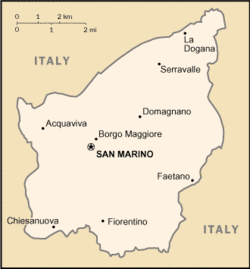Welcome to the Virtual Education Wiki ~ Open Education Wiki
San Marino
Partners situated in San Marino
San Marino in a nutshell
(sourced from http://en.wikipedia.org/wiki/San_Marino)
San Marino, in full the Most Serene Republic of San Marino(Italian: Serenissima Repubblica di San Marino) is a country situated in the Apennine Mountains within Italy. It is a landlocked enclave, completely surrounded by Italy.
It has an estimated population of almost 30,000 and its size is just over 60 km2.
Its capital is the City of San Marino.
One of the European microstates along with Liechtenstein, Vatican City, Monaco, Andorra, and Malta, San Marino has the smallest population of all the members of the Council of Europe.
San Marino is the oldest recorded sovereign state and constitutional republic in the world, having been founded on 3 September 301 by stonecutter Marinus of Rab. Legend has it that Marinus left Rab, then a Roman colony, in 257 when the future emperor, Diocletian, issued a decree calling for the reconstruction of the city walls of Rimini, which had been destroyed by Liburnian pirates. The constitution of San Marino, enacted in 1600, is the world's oldest constitution still in effect.

Although San Marino is not a European Union member, it is allowed to use the euro as its currency by arrangement with the Council of the European Union; it is also granted the right to use its own designs on the national side of the euro coins. Before the euro, the Sammarinese lira was pegged to, and exchangeable with, the Italian lira. The small number of Sammarinese euro coins, as was the case with the lira before it, are primarily of interest to coin collectors.
The tourist sector contributes over 50% of San Marino's GDP, with more than 3.3 million tourists visiting in 1997.[11] Other key industries are banking, electronics, and ceramics. The main agricultural products are wine and cheese.
San Marino's postage stamps, which are only valid for mail within the country, are mostly sold to philatelists and are a source of income. San Marino is a member of the Small European Postal Administration Cooperation.
The per capita level of US$55,449 and standard of living are comparable to those of Switzerland. San Marino imports goods such as food from Italy.
The state has a population of approximately 1,000 foreigners, most of whom are Italians. About 5,000 Sammarinese live in foreign countries, predominantly in Italy.
The language spoken is Italian; the Emiliano-Romagnolo dialect is widely spoken, too. Roman Catholicism is the predominant religion.
San Marino education policy
Primary education is compulsory for all children between the ages of 6 and 14; the adult literacy rate is about 98%. The program of instruction is patterned after the Italian curriculum, and San Marinese school certificates are recognized by Italy. Children go through five years of primary education followed by three years of secondary education at the first stage and a further five years of higher secondary and pre-university education.
San Marino education system
In 1997, there were 14 elementary schools, with 1,170 students and 221 teachers. Student-to-teacher ratio stood at five to one. Middle and upper-secondary schools enrolled 1,192 pupils during the same year.
Higher education
San Marinese students are able to pursue higher education at Italian universities.
Universities in San Marino
(sourced mainly from http://en.wikipedia.org/wiki/San_Marino)
The Università degli Studi della Repubblica di San Marino (University of the Republic of San Marino) is the main university, which includes the Scuola Superiore di Studi Storici in San Marino (Advanced School of Historical Studies), a distinguished research and advanced international study centre governed by an international Scientific Committee coordinated by professor Luciano Canfora. Its web site is at http://www.unirsm.sm
Other important institutes are the
- Instituto Musicale Sammarinese (Sammarinese Musical Institute)
- the Akademio Internacia de la Sciencoj San Marino or Accademia Internazionale delle Scienze San Marino (International Academy of Sciences San Marino) - known for adopting the Esperanto language as language for teaching and for scientific publications; further, it makes a wide use of e-learning. Its web site (in Esperanto) is at http://www.ais-sanmarino.org
Polytechnics in San Marino
There are vocational training schools and a technical institute.
Higher education reform
The Bologna Process
Administration and finance
Quality assurance
San Marino HEIs in the information society
Towards the information society
Information society strategy
Virtual Campuses in HE
Interesting Virtual Campus Initiatives
The Akademio Internacia de la Sciencoj San Marino or Accademia Internazionale delle Scienze San Marino (International Academy of Sciences San Marino) is said to make wide use of e-learning - but no information on scale is available.
Interesting Programmes
Re.ViCa Case-study
Lessons learnt
References
- Virtual Universities – Necessities and Virtues, by Reinhard Fossmeier, International Academy of Sciences (AIS) San Marino - http://www.ais-sanmarino.org/acta/iaupl2000.pdf